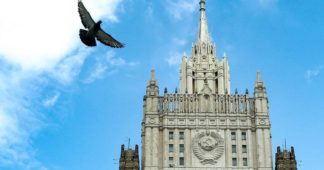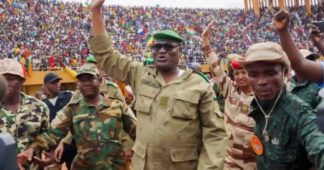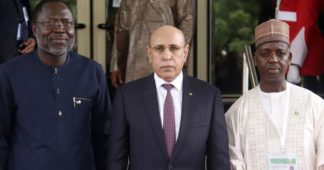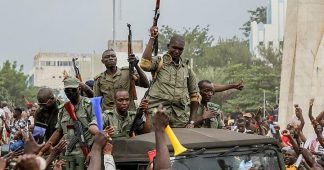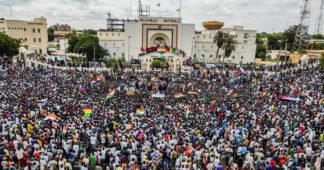Warns of military intervention in violation of the United Nations Charter
Appeals to ECOWAS heads of state at Emergency Summit in Abuja, Nigeria
Vienna, Austria, 8 August 2023
In a statement issued today, the President of the International Progress Organization, Dr. Hans Köchler, called upon the Economic Community of West African States (ECOWAS) to desist from a policy of intimidation and interference concerning the political situation in the Republic of Niger. The threat of military intervention and the punitive sanctions imposed on Niger are in violation of the United Nations Charter and risk further destabilizing the already precarious security situation in the region. These measures and policies have no foundation in the Treaty of ECOWAS, which declares “non-aggression between Member States” as one of the Community’s “fundamental principles” (Article 4[d]), and advocates “peaceful settlement of disputes among Member States.”
In tandem with the withdrawal of financial support by France and the European Union, the massive economic and financial sanctions immediately imposed by ECOWAS and UEMOA (West African Economic and Monetary Union) are going to cause serious hardship to civilians. The embargo has already led to a significant surge in the prices of basic necessities. It amounts to a form of collective punishment and a violation of fundamental human rights of the citizens of Niger. The country’s Prime Minister under the government of President Bazoum, Ouhoumoudou Mahamadou, told France24 that the sanctions would be “disastrous” for the people.
Considering that Community membership of four states – Burkina Faso, Guinea, Mali and Niger – is actually suspended, the other member states of ECOWAS should seek a pacific settlement in conformity with Chapter VI of the UN Charter instead of taking an entire people hostage in a regional dispute. Furthermore, in terms of international law, coercive economic measures can only be imposed by the UN Security Council as measure of collective security under Chapter VII of the Charter. Unilateral coercive measures, whether imposed by a single state or a group of states, are illegal.
Armed intervention in Niger, as threatened by some regional states, would not only be in violation of letter and spirit of the ECOWAS Treaty, but also would constitute a grave breach of Article 2(4) of the United Nations Charter according to which all member states “shall refrain in their international relations from the threat or use of force against the territorial integrity or political independence of any state.” Article 58 of the ECOWAS Revised Treaty of 1993 (“Regional Security”) does not contain provisions justifying armed intervention on the territory of a member state. The option of establishing “peace-keeping forces” in Article 58(2)(f) cannot in any way be interpreted as justifying military action in a member state, in violation of that state’s sovereignty. Lessons should be learned from the disastrous effects of interventions in the civil wars in Liberia and Sierra Leone by the earlier ECOMOG (Economic Community of West African States Monitoring Group). The very establishment of the Group by a “Standing Mediation Committee,” and the exercise of its mandate by way of deployment of de facto fighting units in civil war situations in member states, did neither conform with the constitutional requirements of ECOWAS nor with the Charter of the then OAU or the United Nations.
Referring to the joint communiqué of 31 July 2023 by the Transitional Governments of Mali and Burkina Faso, mentioning, under item 5, “the adoption of self-defense measures [in conformity with Article51 of the UN Charter] in support of the armed forces and the people of Niger” in case of a military intervention in that country, the President of the I.P.O. warned of serious consequences of armed action by some member states in the name of ECOWAS — not only for the people of Niger, but for peace and stability in the region and the entire Africa. He appealed to the heads of state of those countries to pursue – in their forthcoming Emergency Summit in Abuja – the avenue of peaceful dialogue as set out in Chapters II and X of the Revised Treaty of ECOWAS.
Referring to the unilateral military intervention of NATO in Libya, in 2011, instigated by France, and in open defiance of the limits set by Security Council resolution 1973, the International Progress Organization warned of further destabilization in the Sahel region by another armed expedition in violation of the UN Charter. The disintegration of Libya due to NATO intervention has been the root cause of the security vacuum and political instability in the wider region and beyond, including in Europe. As in the case of Niger today, it is up to each country to decide on policies and measures to safeguard its security and vital national interests, without external interference, whether from regional or global powers. “Waging war to keep the peace,” the deceptive motto of many ill-fated interventions in the history of international relations, must not be allowed to justify another act of blatant aggression.
Also read Macron va en guerre en Niger
We remind our readers that publication of articles on our site does not mean that we agree with what is written. Our policy is to publish anything which we consider of interest, so as to assist our readers in forming their opinions. Sometimes we even publish articles with which we totally disagree, since we believe it is important for our readers to be informed on as wide a spectrum of views as possible.

